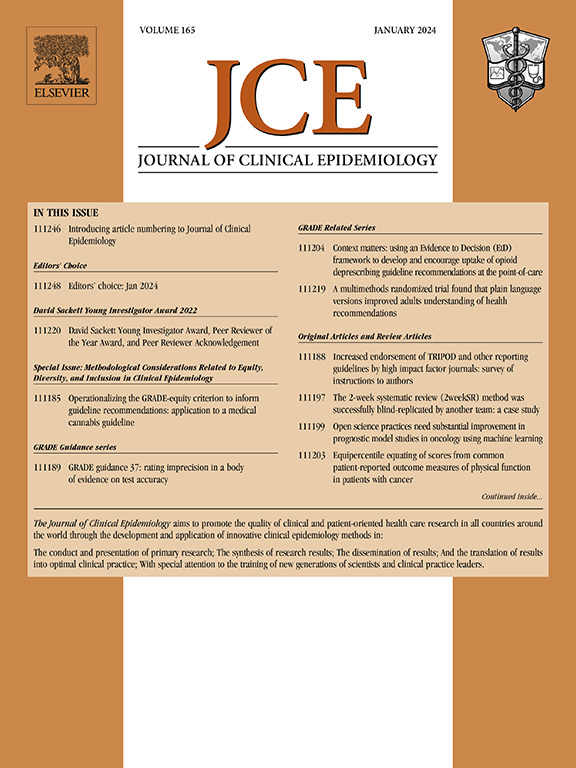肿瘤预测模型研究的同行评议需要改进:对BMC期刊公开同行评议报告的系统综述。
IF 5.2
2区 医学
Q1 HEALTH CARE SCIENCES & SERVICES
引用次数: 0
摘要
目的:评估来自BMC期刊的基于回归的肿瘤学临床预测模型研究的公开同行评议报告的完整性和质量,重点关注对方法学标准、报告指南和建设性反馈的遵守情况。方法:我们检索了2021年BioMed Central期刊上发表的肿瘤领域预测模型研究。数据提取使用了ARCADIA检查表(评估评审质量的13项工具)和附加标准(例如,字数统计,对手稿部分的评论焦点)。两名研究人员独立评估所有公开的同行评议,冲突由第三名研究人员解决。采用描述性统计和叙事综合。结果:同行评议是简短的(中位数:243字;范围:0-677),82.7%的关注方法或结果,但很少解决局限性(结论:我们的研究结果表明,预测模型的同行评议缺乏深度、方法审查和报告标准的执行。这可能会导致有偏见的模型造成临床危害,并使研究浪费永久化。改革是迫切需要的,包括实施报告指南(例如,TRIPOD+AI),强制性审稿人培训,以及承认同行评审是学术工作。期刊必须优先考虑评审方法的严谨性,以确保可靠的预测模型和保障患者护理。本文章由计算机程序翻译,如有差异,请以英文原文为准。
Peer review of prediction model studies in oncology needs improvement: A systematic review of open peer review reports from BMC journals
Objectives
To evaluate the completeness and quality of open peer review reports from BioMed Central (BMC) journals for regression-based clinical prediction model studies in oncology, focusing on adherence to methodological standards, reporting guidelines, and constructive feedback.
Methods
We searched for published prediction model studies in the field of oncology, which were published in BioMed Central journals in 2021. Data extraction used the Assessment of review Reports with a Checklist Available to eDItors and Authors (ARCADIA) checklist (13-item tool assessing review quality) with additional criteria (eg, word count, focus of comments on manuscript sections). Two investigators independently evaluated all open peer reviews, with conflicts resolved involving a third researcher. Descriptive statistics and narrative synthesis were applied.
Results
Peer reviews were brief (median: 243 words; range: 0–677), with 82.7% focusing on methods or results but rarely addressing limitations (<20%) or generalizability. No reviewers verified adherence to reporting guidelines (eg, TRIPOD); only one reviewer mentioned guideline use. Reviews prioritized superficial issues (67.3% focused on presentation) over methodological rigor (38.5% evaluated statistical methods). There are 19.2% suggested statistical revisions and <1% addressed protocol deviations or data availability.
Conclusion
Our findings show that peer reviews of prediction models lack depth, methodological scrutiny, and enforcement of reporting standards. This risks clinical harm from biased models and perpetuates research waste. Reforms are urgently needed, including implementing reporting guidelines (eg, TRIPOD+AI), mandatory reviewer training, and recognition of peer review as scholarly labor. Journals must prioritize methodological rigor in reviews to ensure reliable prediction models and safeguard patient care.
求助全文
通过发布文献求助,成功后即可免费获取论文全文。
去求助
来源期刊

Journal of Clinical Epidemiology
医学-公共卫生、环境卫生与职业卫生
CiteScore
12.00
自引率
6.90%
发文量
320
审稿时长
44 days
期刊介绍:
The Journal of Clinical Epidemiology strives to enhance the quality of clinical and patient-oriented healthcare research by advancing and applying innovative methods in conducting, presenting, synthesizing, disseminating, and translating research results into optimal clinical practice. Special emphasis is placed on training new generations of scientists and clinical practice leaders.
 求助内容:
求助内容: 应助结果提醒方式:
应助结果提醒方式:


